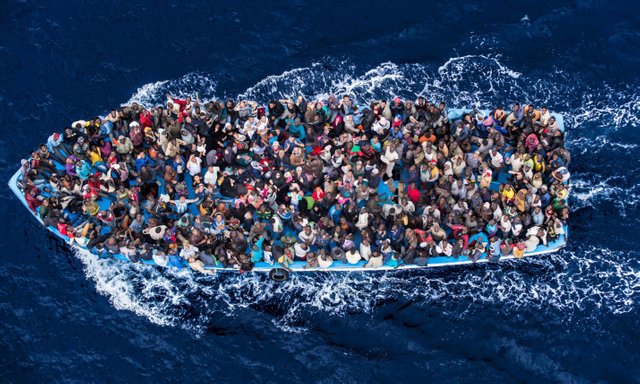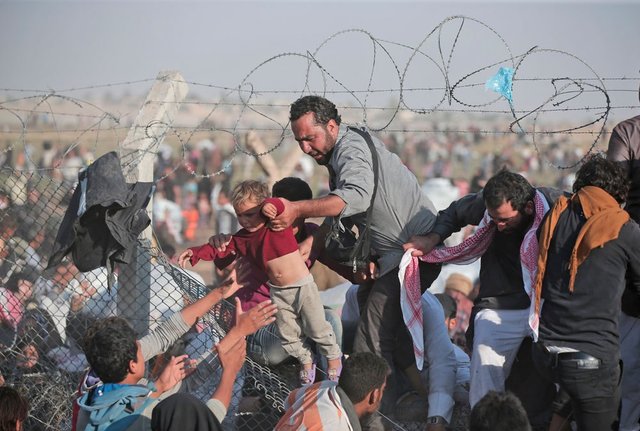EU State’s Efforts to Integrate Immigrants
Integration of foreigners in host societies is the core of immigration policies.
In order to obtain a better integration, there are some key elements that must be provided, such as: knowledge, promotion of fundamental rights, non-discrimination and equal opportunities for all. Integration is a dynamic two-way process of interaction and mutual adaptation which involves efforts from everyone involved: immigrants and residents of Member States on one hand; national, regional and local authorities on the other hand.

One of the most common problems that immigrants face is the language. Knowing the language and having cultural orientation are the keys to a better integration of foreigners in the host society. Language barriers and lack of information about the culture and traditions of the host society is the most common difficulty that authorities need to address primarily. European countries make efforts in order to ease the process of learning the language. For instance, in Romania an increasing number of foreigners receive cultural orientation courses and books with the help of EIF (European investment fund). The representatives of active cultural institutions in the integration of foreigners are professionally trained in aspects of active interculturalism.
1990 is a reference year for the integration of the migrants. Since then, integration became an important tool in the political debate in almost all the EU countries.
However, the policies regarding the “inclusion” of immigrants into the host society started earlier back to 1970s and 1980s.
For example, in the UK, the policies regarding social inclusion of the immigrants, adopted 1980s and 1990s, were mainly focused on “race relations”. Thus, ethnicity and skin color were the main focus of the policies.
In the Netherlands, the 1980s migrants’ policies were reclassified as ethnic minority policies focusing on ethnicity as policy guiding paradigm. This frame underlined the permanent position of immigrants as a minority within Dutch society.
At the beginning of the 1990s ethnic minority’s policies realized an integration policy focusing more on the individual migrants’ integration in both social and economic life (labour, education and housing). After 1990s some of the EU Member States have adopted the concept of multiculturalism in order to perceive the relations between different people in their country, so in this way the differences between countries started to diminish.
In Sweden, in the 1970s integration was actually seen as a legal equality of immigrants and citizens, accompanied by a strict immigration control. Ten years later, multicultural approaches started to gain more importance so the cultural diversity was perceived as a part of integration.
There are three countries in EU which have developed local level integration policies before that this became a policy at the central level. In Austria, Germany and Switzerland integration was an important political issue at the local level since 1990.
At the national level, integration policies involved political responsibilities and specialized institutions were responsible for this.

Austria, Germany and Switzerland are three countries that share a common history of
“guest worker” – policies ,and moreover are federal states which give the opportunity to their provinces or regions to have autonomy, especially in the field of education and social policy.
In the Netherlands as well, the municipalities are usually implementing the integration policies, even though in the big cities (Amsterdam and Rotterdam) distinct urban policies have already been developed.
In Sweden UK and Spain, integration policies were developed at the national level; municipal and regional governments being the first implementing authorities. Spain is declared as one of the main immigration countries in the world, not only in Europe. This is the reason why the Spanish Government gives a significant importance to integration policies and allocates a big budget for this. The Strategic Plan for Citizenship and Integration, issued well-organized policy elements in the regard of integration, according to areas of intervention including: receiving of the migrants; job offers and economic development; schooling; health and social services; mobility and development; peaceful coexistence; equal treatment and preventing discrimination; civic education. Spanish government ensure the right and duty of foreigners under sixteen, to free education, including access to basic and mandatory education. The foreigners under 18 years can also benefit from this, having access to post-compulsory education. This right implies getting academic qualifications and register to the public system of scholarships and grants under the same circumstances as local people.
Regarding the residence issue, there are regulations in every EU country giving the right to get the permanent residence permit. For example Sweden gives the privilege to immigrants who came for labor to get Permanent Residence after Four Years.
International students are now the focus of education and also labor market because they are seen as a reliable solution to” the shortage of skilled personnel”. The Netherlands is one of the first countries that implemented a policy that allowing international graduates to stay in the country after graduating.
When we talk about Family Reunification Regulations, we first look to Sweden which offers grants to foreign spouses, persons living in civil partnerships or non-marital partners; also to the children of the applicant or his partner under 18 years of age the opportunity to move to the country as family migrants “.
Another example of government’s implications in the integration process of immigrants, is Netherlands which was the first country in EU introducing compulsory integration courses for new coming migrants. It became mandatory for migrants to take 600 hours of language courses and lessons on Dutch society. This is a good strategy in order to maintain the peace and avoid the conflicts between locals and immigrants.
When we talk about a republican country of immigration the best example we have is France. France adopted a different strategy based not on special rights and protection, but rather on indifference. The government did not allow and special rights and minority privileges to immigrants just in order to oblige to adapt to the national’s lifestyle.
Regarding the anti-discrimination policy, within EU it has been established an extra concept of discrimination, that includes beside of the direct forms of discrimination, also the indirect discrimination. One of the longest traditions of Anti-discrimination Policy belongs to Great Britain. Social integration is a complex, dynamic and multidimensional process, with different social and cultural starting positions, affecting all spheres of social life and coexistence of citizens in a particular territory. Such a complex process cannot be managed by a single actor even if we talk about the state. So despite the entire efforts states make, we need also other actors to ease the integration process of the immigrants. For instance NGOs are best placed to identify important issues in integration and diversity management, given its proximity to the specific problems of the citizens.
As migration became an issue of competence for the European Union only since 1998, EU programs only indirectly influenced national integration policies up to the 1990s. In this context, programs funded by the European Social Funds were very important. As these programs aimed at the integration of groups in risk of exclusion into the labour market, they also encompassed immigrants and had defined them as target groups since the 1990s. Thus’ programs like YOUTHSTART, INTEGRA, EQUA, URBAN – program funded by the European Regional Funds, had created funding opportunities for municipalities and NGOs in the field of integration. Furthermore, the General Directorate of the European Commission, which dealt with labour market and social policies, had already implemented a network of experts on migration and integration called RIMET (Resseau information surp les migrations des etats tiers) in 1992, which delivered annual reports on migration and integration issues to the European Commission between 1993 and 1998 and can be considered as a forerunner to the European Migration Network established in 2005